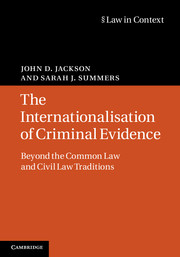Book contents
- Frontmatter
- Contents
- Foreword
- Preface and acknowledgements
- Abbreviations
- Table of international cases
- Part I Evidentiary contexts
- 1 Evidence across traditions
- 2 The common law tradition
- 3 Evidential traditions in continental European jurisdictions
- 4 The international human rights context
- 5 Evidence in the international criminal tribunals
- Part II Evidentiary rights
- Index
- References
4 - The international human rights context
Published online by Cambridge University Press: 05 June 2012
- Frontmatter
- Contents
- Foreword
- Preface and acknowledgements
- Abbreviations
- Table of international cases
- Part I Evidentiary contexts
- 1 Evidence across traditions
- 2 The common law tradition
- 3 Evidential traditions in continental European jurisdictions
- 4 The international human rights context
- 5 Evidence in the international criminal tribunals
- Part II Evidentiary rights
- Index
- References
Summary
Introduction
The previous chapters have drawn attention to the manner in which the common law and civil law traditions have adopted different approaches towards the regulation of evidence in criminal proceedings. Although we have seen that common beliefs in the importance of reaching accurate decisions and accommodating individual rights have underpinned each tradition, there was no conscious attempt to find common ground between the various systems until the second half of the twentieth century, when in the aftermath of the Second World War efforts were made to forge closer links between nations on the basis of shared rights and values. Since then, common principles of fairness have assumed considerable importance in the regulation of the process of proof in criminal proceedings. The development in the second half of the twentieth century of a number of international fair trial provisions forced states to reconsider their national evidential principles, and the values on which these were based, in the light of the right to a fair trial.
This reliance on fairness has not met with universal acceptance. Some have questioned whether fairness is the most satisfactory basis for a theory of the criminal process, while others have drawn attention to the necessary limitations of framing fairness in terms of individual rights. More recently, there has been considerable philosophical debate on the justification for human rights norms, such as the right to a fair trial. Although human rights can be justified on the fundamental moral premises of autonomy and personhood, it can be argued that certain rights such as the right to a fair trial can only be given meaning within the development of social practices and political institutions. Hence, just as we have seen that the notion of defence participation within the context of the criminal process may be better viewed as an institutional right or safeguard within a political system heavily weighted in favour of the state apparatus, so the right to a fair trial may be similarly better viewed as an ‘institutional’ right. Whatever the philosophical justifications, fairness is currently the principal frame of reference for regulating criminal proceedings. The international bodies responsible for interpreting and applying the fair trial principles have amassed a considerable body of case law and this provides an ideal basis on which to reassess some of the major premises of comparative evidence law.
- Type
- Chapter
- Information
- The Internationalisation of Criminal EvidenceBeyond the Common Law and Civil Law Traditions, pp. 77 - 107Publisher: Cambridge University PressPrint publication year: 2012



